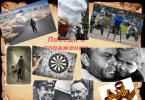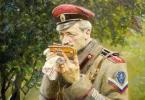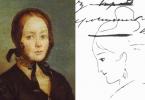Official comment
Direction allows you to reflect on victory and
defeat in different aspects: socio-historical, moral-philosophical,
psychological. The reasoning may be related
as with external conflicting events in life
person, country, world, and with internal struggle
a person with himself, its reasons and
results.
Literary works often show
ambiguity and relativity of concepts
"victory" and "defeat" in different historical
conditions and life situations.
Contrasting the concepts of “victory” and “defeat”
is already inherent in their interpretation. Ozhegov reads: “Victory -
success in battle, war, complete defeat of the enemy.” That is
the victory of one implies the complete defeat of the other.
However, both history and literature give us examples of how
victory turns out to be defeat, and defeat turns out to be victory.
It is about the relativity of these concepts that we propose
for graduates to speculate based on their reading
experience.
Of course, limit ourselves to the concept of victory as defeat
enemy in battle is impossible. Therefore it is advisable
consider this thematic area in different
aspects. Aphorisms and sayings
famous people
The greatest victory is victory over yourself.
Cicero
The possibility that we may fail in
battle should not prevent us from fighting for a cause that
we think it's fair.
A.Lincoln
Man was not created to suffer defeat...
Man can be destroyed, but he cannot be defeated.
E. Hemingway
Be proud only of the victories you have won over
yourself.
Tungsten literature Socio-historical aspect
Here we will talk about the external conflict of social groups, states,
military operations and political struggle.
Peru A. de Saint-Exupery belongs to the paradoxical, on the first
view, statement: “Victory weakens the people - defeat awakens
He has new strength..." We find confirmation of the correctness of this idea in
Russian literature.
“The Tale of Igor’s Campaign” is a famous monument of literature of Ancient Rus'.
The plot is based on the unsuccessful campaign of the Russian princes against the Polovtsians,
organized by Novgorod-Seversk Prince Igor Svyatoslavich in
1185. The main idea is the idea of the unity of the Russian land. Princely
civil strife weakening the Russian land and leading to its ruin
enemies, make the author bitterly sad and lament; Victory over
enemies fills his soul with ardent delight. However, about defeat, not
the victory is told in this work of ancient Russian literature,
after all, it is defeat that contributes to the rethinking of the past
behavior, gaining a new view of the world and oneself. That is defeat
stimulates Russian soldiers to victories and exploits. The author of the Lay addresses all Russian princes
one by one, as if calling them to account and
demandingly reminding them of their duty to
homeland. He calls them to protect the Russian land,
“block the gates of the field” with your sharp arrows. AND
therefore, although the author writes about defeat, there is no
and shadows of despondency. The “Word” is just as laconic and
laconic, like Igor’s addresses to his squad.
This is the call before battle. The whole poem seems to be addressed to
future, permeated with concern for this future. Poem
about victory would be a poem of triumph and joy. Victory -
this is the end of the battle, defeat for the author of the Lay
This is just the beginning of the battle. Battle with the steppe enemy
It's not over yet. Defeat must unite
Russians. The Civil War turned out to be so significant
event in the history of Russia that she could not help but find
reflections in fiction. Basis for
graduates' reasoning may be "Don
stories", "Quiet Don" by M.A. Sholokhov.
When one country goes to war with another,
terrible events: hatred and the desire to defend oneself
forces people to kill their own kind, women and
old people are left alone, children grow up orphans,
cultural and material values are destroyed,
cities are being destroyed. But the warring parties have a goal -
defeat the enemy at any cost. And any war has
the result is victory or defeat. Victory is sweet and immediate
justifies all losses, defeat is tragic and
sad, but it is the starting point for some
another life. But "in a civil war, every victory
there is defeat" (Lucian). The history of mankind consists of victories and defeats in
wars. In the novel “War and Peace” L.N. Tolstoy describes
participation of Russia and Austria in the war against Napoleon.
L. Tolstoy shows a significant difference between
two campaigns: 1805-1807 and 1812. On
The fate of Russia was decided on the Borodino field. Here
desire to save oneself, indifference to what is happening
there were no Russian people. Here, as stated in
Lermontov, “and we promised to die, and the oath of allegiance
We held back in the Battle of Borodino.”
The opportunity to speculate on how victory in one
the battle can turn into a defeat in the war, gives
the outcome of the Battle of Borodino, in which the Russians
troops win a moral victory over
French. Moral defeat of Napoleon's troops
near Moscow - the beginning of the defeat of his army. The life story of the central character of the epic novel
M. Sholokhov “Quiet Don” by Grigory Melekhov,
reflecting the dramatic destinies of the Don Cossacks,
confirms this idea. War cripples from within and
destroys all the most precious things that people have.
She makes the characters look at things in a new way.
problems of duty and justice, seek the truth and
not to find it in any of the warring camps.
Once with the Reds, Grigory sees the same
that whites have cruelty, intransigence, thirst
blood of enemies. Melekhov rushes between two
warring parties. Everywhere he comes across
violence and cruelty that cannot be accepted,
That's why he can't take one side.
The result is logical: “Like a steppe scorched by fires,
Gregory’s life became black...” Moral-philosophical and
psychological aspects
Victory is not only about success in battle. Win a victory,
according to the dictionary of synonyms, - overcome, master, overcome.
And often not so much the enemy as yourself.
Let us consider a number of works from this point of view.
A.S. Griboyedov "Woe from Wit". The conflict the play presents
represents the unity of two principles: public and personal. Being
an honest, noble, progressive-minded person,
freedom-loving, the main character Chatsky opposes
Famusov society. He condemns inhumanity
serfdom, remembering “Nestor of noble scoundrels”,
who exchanged his faithful servants for three greyhounds; to him
I am disgusted by the lack of freedom of thought in noble society:
“And who in Moscow hasn’t had their mouths shut at lunches, dinners and
dancing?". He does not recognize veneration and sycophancy Society is offended and, in defense, declares Chatsky
crazy.
Psychological conflict turns into conflict
public.
I.A. Goncharov assessed the ending of the play this way: “Chatsky
broken by the amount of old power, inflicting it on his
turn a fatal blow with the quality of the new force.”
Chatsky does not give up his ideals, he only
freed from illusions.
Therefore, Chatsky’s defeat is only temporary
defeat and only his personal drama. IN
on a public scale “victory of the Chatskys
inevitable." The “century of the past” will be replaced by the “century
current", and the views of the hero of the comedy Griboyedov
will win. A.N. Ostrovsky "Thunderstorm". Graduates may wish to reflect on the question of
about what Katerina’s death is – victory or defeat. On that
The question is difficult to give a definite answer. Too many reasons have led to
terrible ending. The playwright sees the tragedy of Katerina’s situation in the fact that
she comes into conflict not only with the Kalinov family morals, but also
with myself. The straightforwardness of Ostrovsky's heroine is one of the sources of her
tragedy.
Throughout the play there is a painful struggle in Katerina’s consciousness between
understanding of his wrongness, his sinfulness and vague, but increasingly
an imperious sense of his right to human life. But the play
ends with Katerina’s moral victory over the dark forces,
tormenting her. She atones for her guilt immensely, and from captivity and humiliation
leaves the only way that was open to her. Her decision to die, only
not to remain a slave, expresses, according to Dobrolyubov, “the need
the emerging movement of Russian life." And this decision comes to Katerina
along with internal self-justification. She dies because she believes
death is the only worthy outcome, the only possibility
preserve the highest that lived in her. In the thought that Katerina's death is actually
in fact is a moral victory, a triumph of the real Russian soul over
forces of the “dark kingdom” of the Wild and Kabanovs, is also strengthened by the reaction to its
death of other characters in the play. I.S. Turgenev "Fathers and Sons". The writer shows the struggle in his novel
worldviews of two political directions. The plot of the novel is constructed
on the contrast of the views of Pavel Petrovich Kirsanov and Evgeniy
Bazarov, who are bright representatives of two generations,
not finding mutual understanding.
Turgenev, as it were, takes his heroes through different
tests. And the strongest of them is the test of love. After all
It is in love that a person’s soul reveals itself fully and sincerely.
And then Bazarov’s hot and passionate nature swept away all of him
theories.
It seems that Bazarov is defeated in the test of love.
Firstly, his feelings and he himself are rejected. Secondly, he
falls into the power of aspects of life that he himself denies, loses
the ground under his feet, begins to doubt his views on
life. His life position turns out to be a pose in which,
True, he sincerely believed. Bazarov begins to lose meaning
life, and soon loses life itself. But this is also a victory: love
forced Bazarov to look at himself and the world differently, he
begins to understand that life does not want to fit into anything
into a nihilistic scheme. F.M. Dostoevsky "Crime and Punishment".
"Crime and Punishment" is an ideological novel,
in which non-human theory collides with
human feelings.
The writer finds a surprisingly accurate expression,
characterizing Raskolnikov’s internal state:
it was as if he had cut himself off from everyone with scissors and
everything." The hero becomes disappointed in himself, believing
that he did not pass the test of being a ruler, but
This means, alas, that it belongs to “trembling creatures.”
Surprisingly, Raskolnikov himself would not want
be a winner now. After all, winning means
morally die, remain with your spiritual
chaos forever, to lose faith in people, yourself and life.
Raskolnikov's defeat became his victory - victory
over himself, over his theory, over the Devil, who
took possession of his soul, but failed to oust him forever
her God. M.A. Bulgakov "The Master and Margarita".
The novel “The Master and Margarita” is about responsibility
man for the good and evil that is committed on
earth, for your own choice of life paths,
leading to truth and freedom or to slavery,
betrayal and inhumanity. It
all-conquering love and creativity, uplifting
soul to the heights of true humanity.
The author wanted to proclaim: the victory of evil over
good cannot be the end result
social and moral confrontation. This
according to Bulgakov, nature itself does not accept
human, should not allow the whole move
civilization. Of course, the range of works in which
the thematic direction “Victory” is revealed
and defeat” is much broader. Main -
see the principle, understand that victory and defeat are
concepts are relative.
R. Bach wrote about this in his book “Bridge over
eternity": "What matters is not whether we lose the game,
what matters is how we lose and how thanks to this
let's change, what's new for ourselves, how
We can apply this to other games. strange
the way defeat turns out to be victory.” sources
http://www.wpclipart.com/blanks/book_blank/diary_open_blank.png notebook
http://7oom.ru/powerpoint/fon-dlya-prezentacii-bloknot-07.jpg sheets
https://www.google.ru/search?q=%D0%B5%D0%B3%D1%8D&newwindow=1&source=lnms&tbm=i
sch&sa=X&ved=0ahUKEwjO5t7kkKDPAhXKEywKHc7sB-IQ_AUICSgC&biw=1352&bih=601#newwind
ow=1&tbm=isch&q=%D0%B5%D0%B3%D1%8D+%D0%BB%D0%BE%D0%B3%D0%BE%D1%82%D0%B8%D0%BF&i
mgrc=QhIRugc5LIJ5EM%3A
http://www.uon.astrakhan.ru/images/Gif/7b0d3ec2cece.gif compass
http://4.bp.blogspot.com/-DVEvdRWM3Ug/Vi-NnLSuuXI/AAAAAAAAAGPA/28bVRUfkvKg/s1600/essay-clipa
rt-24-08-07_04a.jpg
student
http://effects1.ru/png/kartinka/4/kniga/1/kniga_18-320.png books
Methodological recommendations for preparing for writing the final essay in 2016/2017
academic year for teachers of Russian language and literature - Stavropol, 2016. - 46 p.
The author of the presentation is a teacher of Russian language and literature, MBOU Secondary School No. 8, Mozdok, RSO-Alania, Pogrebnyak N.M.
“Events of the War of 1812” - French Army. The main forces of Kutuzov. Congress of Vienna. Beginning of the War of 1812. Barclay. Napoleon's retreat. Russian troops accompanied by refugees. Main dates and events of the War of 1812. Napoleon's entry into Moscow. Battle of Nations. Russian poet. French people. Expulsion of the French from Russia. Battle of Maloyaroslavets.
“War with Napoleon 1812” - It’s not for nothing that all of Russia remembers Borodin’s day. The liberation of Europe and the glory of Alexander the First. A wonderful lot. On the wings of fear. Memoirs of 1812. Davydov about Napoleon. Poet, partisan, hero. Poetic chronicle. Battle of Borodino. On the ashes of Moscow. The smoke of the battle fled away, the sound of swords was not heard. Sacred memory of 1812.
“Patriotic War of 1812 in Russia” - The beginning of the war. The balance of forces on the eve of the Battle of Borodino. In memory of the War of 1812. Alexander Column on Palace Square in St. Petersburg. Z armies. Retreat of the Russian army. Tarutino maneuver. England and Spain made a certain contribution to Russia's victory. Battle for the Shevardinsky redoubt. Heroes of the War of 1812.
“Questions about the War of 1812” - Memorable places of the War of 1812. Buckshot. Redoubt. Pyotr Ivanovich Bagration. Monument. G. Maloyaroslavets. Dragoons. Hussars. Nadezhda Andreevna Durova. Lancers. When Napoleon occupied Moscow without a fight. Name the river from which the Patriotic War began. What is the date of the Battle of Borodino? Berezina River.
“The Great War of 1812” - Anthem of Russia. The idea of owning the world. Mikhail Illarionovich Golenishchev-Kutuzov. What did the Tver militia consist of? Mikhail Yurjevich Lermontov. Partisan of the Patriotic War of 1812, military writer, poet. He was a staff captain of artillery. Jaeger battalion. Napoleon Bonaparte. August 26, 1812. Vasily Vasilievich Vereshchagin.
“War in 1812” - Results of the Patriotic War of 1812. Armed forces of opponents. Napoleon, surrounded by generals, leads the Battle of Borodino. Southern direction (October-December 1812). Drawing from 1896. Capture of Moscow (September 1812). Oudinot and MacDonald were stuck in low-intensity fighting, remaining in place.
There are 41 presentations in total


Success
Luck
Celebration
Accomplishment
First place
Palm branch
VICTORY
- success in battle, war
complete defeat of the enemy
- success in fighting for something,
accomplishment, achievement of something
as a result of overcoming
DEFEAT
Failure in war, struggle, defeat.
Collapse
Failure
Knockout
Destruction
Losing
Surrender

subject of dispute
Possible logic for revealing the topic
Rival 1
Rival 2
actions
result of action

Logic of topic disclosure
- What is the nature of the struggle: internal or external?
Who is involved in the fight?
- How does the confrontation take place through the eyes of each opponent? On what level: moral? Psychological? What actions is it expressed by?
- Which of the rivals can be called the winner in the struggle for the subject of the dispute?
Is his victory absolute?
What if you look at it through the eyes of a defeated person?
Will the vanquished recognize his
defeat?
Is it absolute?
- What is the subject of dispute or conflict?
What (or what) are we fighting for?
2. What is the nature of the struggle: internal or external? Who is involved in the fight?
3. How does the confrontation take place through the eyes of each opponent? On what level: moral? Psychological? What actions is it expressed by? Are these actions clear?
4. Which of the rivals can be called the winner in the struggle for the subject of the dispute? Is his victory absolute? What if you look at it through the eyes of a defeated person? Does the defeated admit his defeat? Is it absolute?

To be above circumstances means to win
(historical aspect: war
“The Tale of a Real Man” by B. Polevoy)
Victory at any cost
When victory turns into defeat...
"The Veldt" by R. Bradbury)
(moral and philosophical aspect:
"Mad Evdokia"
A. Aleksin)
What doesn't kill me makes me stronger
(psychological aspect:
“Scarecrow” by V. Zheleznikov)

Literary material:
- “War and Peace” by L.N. Tolstoy (did Kutuzov lose by leaving the capital? Did Napoleon win by taking it? Pierre and Helen in the struggle for happiness. Who wins and why?)
- “Fathers and Sons” by I.S. Turgenev (having been defeated in love, in what way did Bazarov win?)
- “Heart of a Dog” M.A. Bulgakov
(Can a person defeat the power of nature? And in what way does he win, recognizing his own powerlessness?)

Literary material: who wins and loses in what ways?
- “Paradox” by V.G. Korolenko (Physically limited, the “phenomenon” shows the unlimited possibilities of the human spirit and instills optimism and faith in the boys)
- “Telegram” by K. G. Paustovsky (Having organized and successfully held an exhibition of the artist’s works, the main character still loses. In what?)
- “Matryona’s yard” by A.I. Solzhenitsyn (In the eyes of her fellow villagers, Matryona loses as a housewife, but morally she stands much higher than them)

Literary material: who wins and loses in what ways?
- “There May Be Tigers Here” by R. Bradbury
(By leaving an amazing and generous planet, astronauts lose the chance to find happiness)
- “The Book Thief” by M. Zusak (The power of words turns out to be stronger than death itself, it is the love of the book that saves the main character in life’s circumstances and teaches her to win)
- “Roadside Picnic” by A. and B. Strugatsky
(In search of the golden ball, the stalker sacrifices the life of a very kind young man. Does he win in this case?)

Possible topics
- Is it possible to live a happy life without victories?
- To win the “war”, sometimes you need to lose the “battle”. (N. Bonaparte)
- Victory over fear gives us strength. (V. Hugo)
- Victory can be achieved quickly, but it is difficult to secure it. (Ranke)
- The most important victory is victory over yourself
- Discipline is the mother of victory. (A.V. Suvorov)
- If you want to conquer the whole world, defeat yourself (F.M. Dostoevsky)
- Winning is the stupidest thing. Not to win, but to convince - that is what is worthy of glory. (V. Hugo)
- Victory is always desirable.
- Victory and defeat are relative concepts...

Internet resources
Website: fipi.ru
essay11.rf
Slide 2
Conceptual processing
In Ozhegov’s dictionary it is written that victory is success in battle, war, complete defeat of the enemy, but the second meaning of the word is success in the struggle for something, implementation, achievement of something as a result of overcoming something. Defeat is failure in war, struggle, but the second meaning of the word is failure in the struggle for something, the impossibility of achieving or overcoming something.
Slide 3
The main problems that may arise in the formulation of topics in the direction of “Victory and defeat”
Problems: Victory/defeat of the people in war, victory of the people on the historical path of development (socio-historical aspect of revealing the direction). Victory/defeat of the hero in his clash with society (social aspect). Victory/defeat of the hero's idea, philosophical quest, worldview, life attitudes (moral and philosophical aspect of revealing direction). Victory/defeat of the hero in his internal struggle with himself (psychological aspect). A person’s attitude towards his victory/defeat.
Slide 4
Approximate list of references
Particular attention should be paid to the problem of victory or defeat in a person’s struggle with himself. 1. “The Tale of Igor’s Campaign” 2. A. Griboyedov “Woe from Wit” 3. A.S. Pushkin “The Battle of Poltava”; “Eugene Onegin” 4. I. Turgenev “Fathers and Sons” 5. F. Dostoevsky “Crime and Punishment” 6. L.N. Tolstoy “Sevastopol Stories”; "War and Peace"; “Anna Karenina” 7. A. Ostrovsky “Thunderstorm” 8. A. Kuprin “Duel” 9. M. Bulgakov “White Guard”; “The Master and Margarita” 10. B. Vasiliev “And the dawns here are quiet”; “Don’t shoot white swans”, “Not on the lists” 11. Yu. Bondarev “Hot snow”; “The battalions ask for fire” 12. E. Hemingway “The Old Man and the Sea” 13. E.M. Remarque “All Quiet on the Western Front” 14. V.P. Astafiev "Tsar Fish"
Slide 5
Possible essay topics in accordance with specific problems
Victory/defeat of the hero in the fight against himself Only the one who defeats himself wins in this life. Who conquered his fear, his laziness and his uncertainty. All victories begin with victory over yourself. “Victory over fear gives us strength” (V. Hugo)
Slide 6
What is victory? What is defeat? (on the relativity of understanding concepts) Victory achieved by violence is tantamount to defeat, because it is short-term. What is the line between victory and defeat? Do you agree with the statement “Victory… defeat… these lofty words are meaningless”? “To win a “war”, sometimes you need to lose a “battle”” (N. Bonaparte) Victory can be quickly achieved, but it is difficult to consolidate it. (Ranke) Is it necessary and possible to judge the winners? Is every defeat really a defeat, and every victory a victory?
Slide 7
A person’s attitude towards his victory/defeat No victory will bring as much as one defeat can take away. It's hard to admit defeat when you're so close to victory. Is it possible to live a happy life without victories?
Slide 8
Aphorisms and sayings of famous people:
The greatest victory is victory over yourself. Cicero The possibility that we may be defeated in battle should not prevent us from fighting for a cause that we consider just. A. Lincoln Man was not created to suffer defeat... Man can be destroyed, but he cannot be defeated. E. Hemingway Be proud only of the victories you have won over yourself. Tungsten
View all slides




